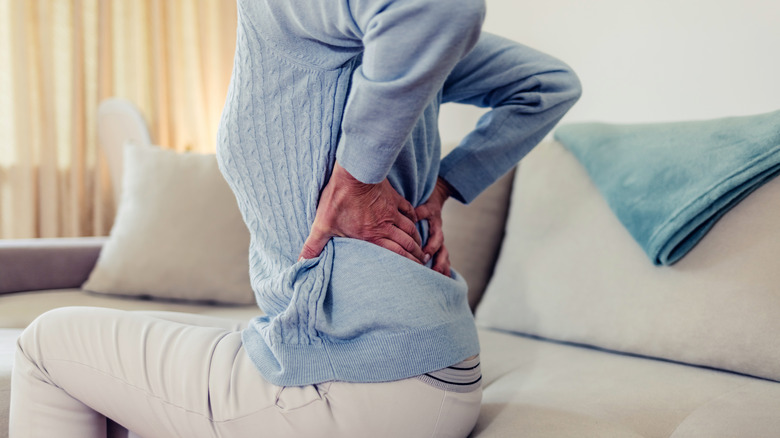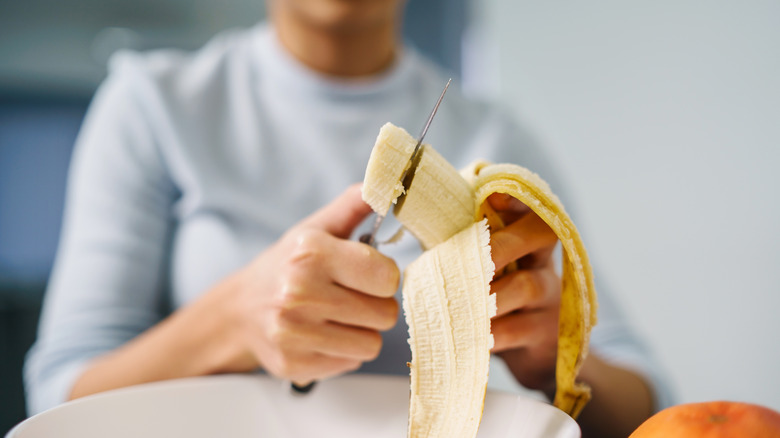The Popular Fruit That Can Reduce Your Risk Of Kidney Stones
The sharp and excruciating pain of kidney stones is not something you easily forget. Some even liken it to the agony of childbirth and labor. Passing the stones, after a surgical procedure or medication, is also extremely unpleasant. There's severe pain with each trip to the bathroom until all the deposits have left your system.
The renal calculi themselves are tiny crystals made up of minerals and salts. While it's hard to pinpoint exactly one cause of the condition, you can get clues by looking at the various types of stones — calcium, uric acid, struvite, and cystine. Having too much calcium oxalate or calcium phosphate in your body can lead to calcium stones. With uric acid types, the concern is that not enough purine is being flushed out of your system. Struvite stones form because of ammonia-causing bacteria, while cystine stones are the result of a rare disease. For the purpose of clarity, the most common type of kidney deposit is calcium oxalate.
If you've ever had kidney stones or been near a loved one who had them, you know all about the ordeal. So much so that you probably want to decrease your risk of developing them. Diet is a considerably large piece of the puzzle. Bananas, in particular, can help.
A banana a day could keep the stones away
There are a few reasons why this popular fruit should be added to your diet when you're looking to prevent kidney stones. Notably, it's got lots of potassium, vitamin B6, and magnesium. According to the U.S. Department of Agriculture, one medium banana of 118 grams has 422 milligrams of potassium, 0.433 milligrams of vitamin B6, and 31.9 milligrams of magnesium.
Potassium is thought to prevent the formation of kidney stones by reducing the amount of calcium that gets flushed out of your system. When a lot of the element is flushed out, the remaining excess oxalate doesn't have the chemical to bind with. This means it won't leave your body as poop but make its way to your urine. Here, they can clump together and form kidney stones. According to a 2022 study conducted by Mayo Clinic researchers and published in Mayo Clinic Proceedings, a low calcium and low potassium diet were found to be even more important predictors of recurrent kidney stones than fluid intake.
The role of vitamin B6 in kidney stone prevention is a nuanced one. Scientists have found links between vitamin B6 deficiency and calcium oxalate kidney stone development. In fact, the deficiency was also associated with renal damage, per a 2023 study published in Nature Reviews Urology. However, the same study notes that attempts to replicate the experiment on humans provided mixed results. Elsewhere, some research suggests that magnesium can prevent calcium oxalate crystallization in urine.
Consuming bananas for kidney health: Things to consider
The benefits of consuming bananas are many, kidney stone prevention aside. Their fiber content can promote healthy digestion and poop habits and protect your heart, and their nutrients are a good source of energy for when you need a pick-me-up during your day. Their electrolytes (potassium and phosphorous) can help with muscle function and other bodily processes.
When it comes to kidney health, however, the scales can tip toward the negative in the case of kidney disease or damage. When your kidneys are not working the way they're supposed to, your body has trouble flushing out excess potassium from your system. This can lead to a host of complications like heart palpitations, nausea, weakness, muscle cramps, breathing issues, and chest pain. Adding bananas to your diet might not always be a problem, depending on what stage of kidney disease you're dealing with, but make sure you run it by your doctor.
If kidney damage is not a concern, it's safe to add bananas to your diet — it's considered a well-tolerated fruit for most. You can consume about one to two bananas a day. You may also want to know about foods that could cause kidney stones. With Mayo Clinic reporting that one in 10 people will experience the discomfort of a kidney stone in their lifetime, you can never be too careful.


